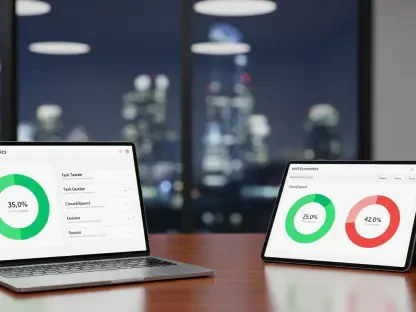In the vast and intricate landscape of global finance, few players exert as much unseen influence as Fair Isaac Corporation, commonly known as FICO, which serves as the mastermind behind the FICO® Score. This critical metric determines creditworthiness for millions of individuals across the United States and beyond, shaping access to loans, mortgages, and credit cards while silently guiding life-altering financial decisions. Far from being just a number, the FICO® Score, used by 90% of top U.S. lenders, has become a bedrock of trust and standardization in lending. Yet, FICO’s reach extends well past personal credit, impacting industries from banking to retail through sophisticated analytics and decision-making tools. This article explores the profound role FICO plays in modern financial systems, tracing its journey from a pioneering startup to a data-driven titan. More than that, its software solutions tackle fraud, optimize customer interactions, and refine marketing strategies, turning complex data into actionable insights. As digital transformation accelerates, FICO’s ability to adapt and innovate positions it as a linchpin in shaping economic landscapes worldwide, making it a force worth understanding in depth.
The Roots and Modern Reach of FICO
Pioneering a Financial Revolution
The story of FICO begins in 1956, when visionaries Bill Fair and Earl Isaac sought to transform business problem-solving through the power of mathematics. Their groundbreaking idea was to apply statistical models to assess risk, a concept that birthed the first credit scoring system in the late 1950s. This innovation fundamentally altered the lending industry by introducing a consistent, objective method to evaluate borrowers, replacing subjective judgments with data-driven precision. Over time, their work laid the foundation for a standardized approach that reduced bias and enhanced fairness in financial decisions. The launch of the FICO® Score in 1989 marked a defining moment, establishing a benchmark that would dominate consumer credit assessment in the U.S. This score became a trusted tool, enabling lenders to make informed choices swiftly and reliably, while also providing consumers with a clearer understanding of their financial standing.
Beyond its historical milestones, FICO’s evolution reflects a relentless drive to stay relevant in a changing world. From its early focus on credit risk, the company expanded into broader analytics, addressing needs across multiple sectors. Today, it serves not just financial institutions but also insurers, retailers, and government bodies, offering solutions that span far beyond a single numerical score. Its ability to adapt to technological advancements and regulatory shifts has cemented its status as a cornerstone of global finance. The impact of those early innovations continues to resonate, as FICO’s methodologies influence how trust and opportunity are quantified in economies around the world, shaping access to resources in ways both subtle and profound.
Expanding Beyond a Single Score
While the FICO® Score remains the company’s most recognized product, its portfolio has grown to encompass a wide array of tools designed to meet modern business challenges. The dual-segment business model splits focus between Scores and Software, each playing a vital role in revenue generation. The Scores segment, tied to the iconic credit metric, earns through transaction fees, subscriptions, and licensing deals with credit bureaus and lenders. This provides a steady financial base, as the score’s widespread adoption ensures consistent demand. Meanwhile, the Software segment delivers enterprise solutions for fraud detection, customer lifecycle management, and marketing analytics, often via cloud-based subscriptions. These tools empower businesses to automate decisions, mitigate risks, and enhance efficiency, catering to a diverse client base across industries.
The broader impact of FICO’s offerings lies in their ability to transform raw data into strategic insights. For instance, solutions like the FICO® Falcon® Fraud Manager help organizations combat financial crime in real time, protecting both businesses and consumers. Similarly, customer management tools enable tailored interactions, fostering loyalty and optimizing engagement. This expansion into software reflects a strategic pivot toward recurring revenue models, aligning with industry trends like digital transformation. By addressing complex needs beyond credit assessment, FICO positions itself as an indispensable partner in operational decision-making, reinforcing its influence across global markets and ensuring resilience in a competitive landscape.
Financial Performance and Industry Standing
A Track Record of Strength
FICO’s financial health stands as a testament to its enduring relevance in the financial ecosystem. The company consistently reports revenue growth in the high single-digit to low double-digit range, underpinned by strong operating and net profit margins that highlight operational efficiency. Robust cash flow generation further supports its ability to invest in innovation while returning value to shareholders. This financial stability has translated into impressive stock performance, often outpacing broader market indices over various time horizons. Investors view FICO as a reliable growth stock, bolstered by the increasing demand for data analytics and decision-making tools in an era of digital dependency. Such metrics underscore confidence in the company’s ability to sustain its upward trajectory amid evolving economic conditions.
Beyond raw numbers, FICO’s valuation tells a story of market trust. Trading at a premium price-to-earnings ratio and elevated enterprise value-to-EBITDA figures, the company reflects strong investor belief in its future earnings potential and competitive advantages. However, this high valuation also introduces caution, as some analysts warn of potential overvaluation risks in volatile markets. Despite such concerns, the consistent performance and strategic focus on recurring revenue through cloud-based solutions provide a buffer. FICO’s financial strength not only fuels its research and development efforts but also positions it as a leader capable of navigating industry shifts, maintaining a balance between growth and stability that few competitors can match.
Facing Competition and Challenges
In the realm of credit scoring, FICO holds an unrivaled position, with its flagship score dominating the U.S. market. Yet, alternatives like VantageScore and in-house models developed by large financial institutions present ongoing competition, challenging its monopoly. In the broader analytics and software space, FICO contends with formidable players such as SAS Institute, IBM, and Oracle, alongside nimble fintech startups offering specialized solutions. These rivals push FICO to continuously innovate, ensuring its products remain relevant in a fast-evolving field. The company’s strengths—brand recognition, proprietary data, and deep industry expertise—provide a significant edge, but staying ahead requires constant adaptation to customer expectations and technological advancements.
Regulatory pressures add another layer of complexity to FICO’s operating environment. Compliance with stringent laws like the Fair Credit Reporting Act (FCRA) in the U.S. and global regulations such as the General Data Protection Regulation (GDPR) demands significant resources and vigilance. These rules, aimed at ensuring data privacy and algorithmic fairness, can restrict data usage or increase operational costs, particularly if concerns over bias in predictive models escalate. Additionally, economic downturns pose a risk by reducing lending activity, which directly impacts transaction-based revenue. Data security threats further complicate the landscape, as breaches could undermine trust in FICO’s systems. Navigating this intricate web of challenges is essential for maintaining market leadership and safeguarding long-term growth.
Innovation, Opportunities, and Future Pathways
Driving Progress Through Technology
At the heart of FICO’s success lies a commitment to innovation, evident in its expansive product portfolio and heavy investment in research and development. The FICO® Score remains the gold standard for credit risk assessment, but tools like the FICO® Platform and Falcon® Fraud Manager address broader needs, from integrated decision management to real-time fraud prevention. Leveraging artificial intelligence (AI) and machine learning (ML), FICO enhances the accuracy and speed of its predictive models, enabling businesses to make informed choices instantly. This focus on cutting-edge technology ensures that solutions remain relevant amid rapid digital transformation, meeting the growing demand for automation and personalization across sectors.
The protection of intellectual property through numerous patents further solidifies FICO’s competitive edge. These patents cover proprietary algorithms and methodologies, creating high switching costs for clients and barriers for rivals. Cloud computing is another area of focus, with a shift toward software-as-a-service (SaaS) models offering scalability and recurring revenue. Such strategic moves align with industry trends, positioning FICO to capitalize on the increasing reliance on data-driven decision-making. By continuously refining its offerings through rigorous research, FICO not only maintains its leadership in credit scoring but also carves out a significant presence in enterprise analytics, ensuring adaptability in a landscape defined by technological disruption.
Seizing Growth in New Frontiers
FICO’s future growth hinges on its ability to tap into emerging opportunities, particularly in markets with developing credit infrastructures. Regions with nascent financial systems present fertile ground for expansion, where FICO’s expertise in risk assessment can establish trust and standardization. By tailoring solutions to local needs, the company can help build robust credit ecosystems, fostering financial inclusion while securing new revenue streams. This global outreach is complemented by strategic partnerships and potential acquisitions, which could broaden its footprint and capabilities in untapped areas, ensuring sustained relevance on an international scale.
Another promising avenue lies in the integration of alternative data to assess creditworthiness for underserved populations, often referred to as the “credit invisible.” By incorporating non-traditional metrics such as utility payments or rental history, FICO can expand access to financial services for millions, aligning with regulatory pushes for inclusivity. Simultaneously, the adoption of cloud-based solutions offers scalability and efficiency, catering to businesses seeking flexible, cost-effective tools. Enhancements in AI and ML further bolster capabilities in fraud detection and personalized marketing, opening doors to industries beyond finance, such as healthcare and utilities. These opportunities, if harnessed effectively, position FICO to drive significant growth while addressing societal and economic gaps.
Envisioning Tomorrow’s Landscape
Looking ahead, FICO’s trajectory appears promising, with bullish scenarios projecting sustained double-digit revenue growth over the coming years, starting from 2025. This optimism stems from anticipated demand for real-time decision-making tools and fraud prevention solutions, fueled by ongoing digital transformation across industries. Expansion into new regions, coupled with advancements in AI-driven analytics, could further accelerate this momentum. The company’s strategic focus on cloud adoption also promises more predictable revenue through subscription models, enhancing financial stability. If FICO continues to innovate and adapt, its role as a linchpin in global finance is likely to strengthen, shaping how risk and opportunity are measured worldwide.
However, a more cautious outlook highlights potential pitfalls that could temper this growth. Regulatory clampdowns on data privacy and algorithmic transparency remain a significant threat, potentially increasing compliance costs or limiting operational flexibility. Intensified competition from fintech innovators and alternative scoring models could erode market share if FICO fails to differentiate its offerings. Economic slowdowns, which reduce lending volumes, also pose a risk to transaction-based revenue. Long-term success will depend on navigating these challenges with agility, maintaining a balance between technological advancement and ethical data practices. Staying ahead in predictive analytics while addressing privacy concerns will be critical to securing FICO’s future in a rapidly shifting environment.
Reflecting on a Legacy of Impact
Building on Past Achievements
Reflecting on decades of influence, FICO’s journey reveals a remarkable capacity to shape the financial world through innovation and resilience. Since its inception in 1956, the company carved a path from pioneering credit scoring to becoming a global leader in analytics, with the FICO® Score emerging as an industry standard that redefined lending practices. Its expansion into software solutions tackled pressing issues like fraud and customer engagement, demonstrating an ability to evolve with market demands. Financially, FICO delivered consistent growth and stability, earning trust from investors who saw it as a cornerstone of data-driven decision-making. This legacy of transformation underscores a commitment to turning complex challenges into standardized, reliable solutions.
Charting the Next Steps
As FICO’s historical impact becomes evident, attention turns to actionable strategies for sustaining its influence. Prioritizing investment in artificial intelligence and cloud technologies emerges as a key focus to meet the rising demand for real-time, personalized tools. Exploring partnerships in emerging markets offers a pathway to expand reach, while integrating alternative data promises to bridge gaps for underserved populations. Addressing regulatory challenges through transparent, ethical practices stands out as essential for maintaining trust and compliance. By diversifying into new industries and fortifying data security, FICO can further solidify its role in shaping global finance. These steps, rooted in adaptability and foresight, provide a roadmap for navigating future complexities with confidence and purpose.









